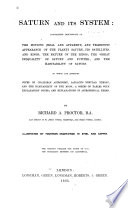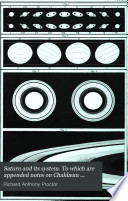 | 1863 - 852 pages
...afterwards mentioned, Newton is understood to have at first rested his law of universal gravitation : ' Every particle of matter in the universe attracts...and inversely to the square of the distance between them ' — a law, the truth of which, since it was first broached, has been put beyond all question... | |
 | Royal United Services Institute for Defence Studies - 1863 - 778 pages
...subject to one source of great uncertainty. Newton laid down the law of universal gravitation, " That every particle of matter in the universe attracts every other particle with a force directly proportionate to the mass of the attracting particle, and inversely to the square of the distance between... | |
 | William Adolph - 1864 - 428 pages
...repel each other : it cannot be laid down as law, that, according to Newton " every particle of matter attracts every other particle, with a force directly...and inversely to the square of the distance between them." If this were true, all things created would either amalgamate into one lump, or, the heavenly... | |
 | William Hughes - 1864 - 188 pages
...exert give rise to all the celestial phenomena. Universal Gravitation is, then, the principle that " every particle of matter in the universe attracts every other particle, with a force which is inversely poportional to the square of the distance between them" or, in other words, with... | |
 | Richard Anthony Proctor - 1865 - 302 pages
...Newton—the last to rush from particular phenomena to general theories—in the grand cosmical law :—' Every particle of matter in the universe attracts every other particle with a force varying directly as the product of the masses and inversely as the square of the distance.' Under this... | |
 | Richard Anthony Proctor - 1865 - 312 pages
...the last to rush from particular phenomena to general theories— in the grand cosmical law : — ' Every particle of matter in the universe attracts every other particle with a force varying directly as the product of the masses and inversely as the square of the distance.' Under this... | |
 | Louis Figuier - 1866 - 542 pages
...which render it prohable that it is derivative. The law of gravitation enunciated by Newton is, that every particle of matter in the universe attracts every other particle with a force which diminishes as the square of the distance increases. Under this law a stone falls to the ground... | |
 | Albert Taylor Bledsoe, Sophia M'Ilvaine Bledsoe Herrick - 1870 - 560 pages
...identical with the law itself, and not something different from it. Thus, for example, the fact that every particle of matter in the universe attracts every other particle with a certain force, is the law of gravity. The observance is the law, and the law is the observance. There... | |
 | 1868 - 870 pages
...in gorgeousness by the worldfamous weddings of the Adriatic.' GRAVI'NA, a commercial and industrious universe attracts every other particle with a force...and inversely to the square of the distance between them ' — a law, the truth of which, since it was first broached, has been put beyond all question... | |
 | 1868 - 872 pages
...in gorgeousness by the worldfamous weddings of the Adriatic.' GRAVI'NA, a commercial and industrious attracts every other particle with a force directly...and inversely to the square of the distance between them ' — a law, the truth of which, since it was first broached, has been put beyond all question... | |
| |